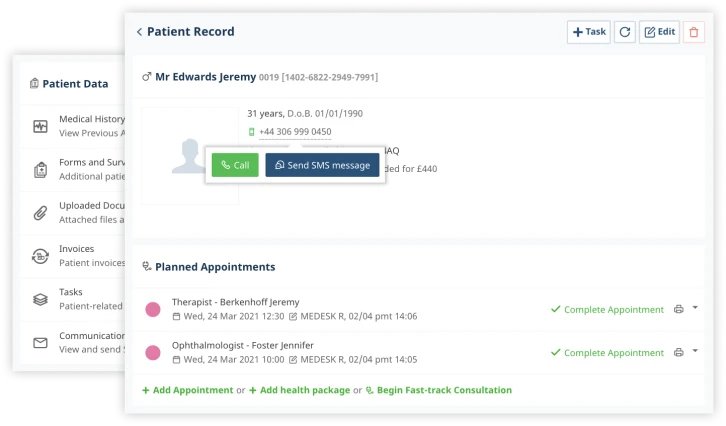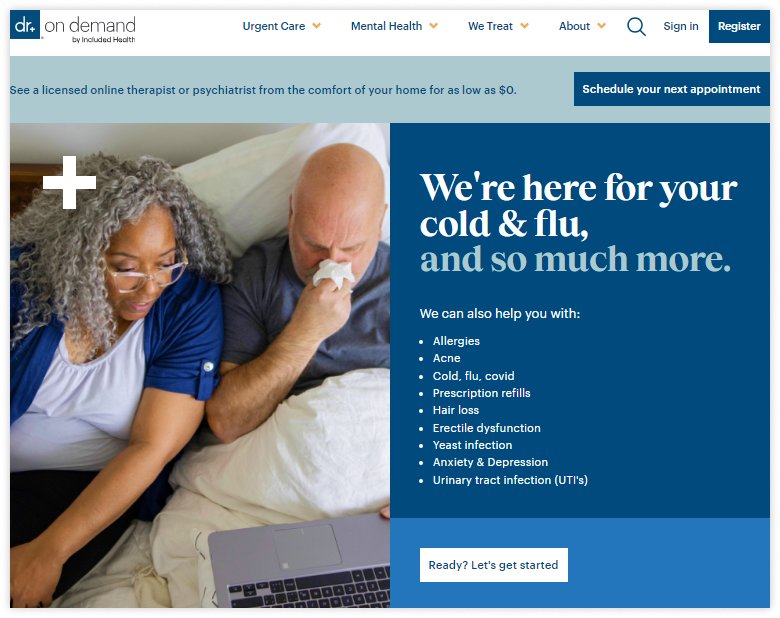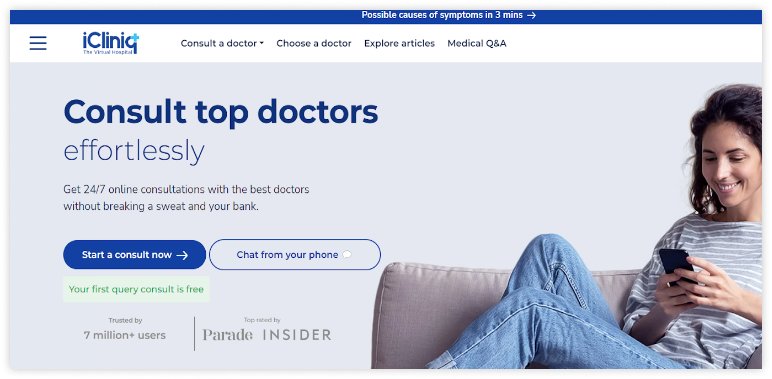Today’s global world is, more and more, a digital one. This has resulted in many professions feeling the call to create a digital presence, either as a marketing tool or as the actual platform by which they provide their services.
Consultants are no different, especially healthcare consultants. With an online consultation platform or website, it’s never been easier to see patients, organize bookings, access patient data, and issue prescriptions. For patients, the benefits are similarly extensive: the convenience and ease of using digital platforms to access practitioners from home cannot be overstated.
With that in mind, it’s crucial for healthcare consultants to have a consultancy platform or website to offer. Yet the actual process of building said platform or website can certainly seem confusing or overwhelming.
Learn how to simplify your practice workflow and free up more time for patients with Medesk.
Open the detailed description >>Thankfully, this article is here to offer a helping hand. We’ll teach you everything there is to know about building your consultancy platform or website — all you need to do is keep on reading.
Why Do Consultants Need a Platform or Website?
Consulting is a varied profession that can occur in many different businesses, such as financial services, management — and healthcare.
The healthcare industry, like many others, has witnessed a sea change due to new technologies, artificial intelligence, and machine learning. With the medical experience becoming increasingly digitized, patients and doctors alike are experiencing such things as operational improvements and enhanced patient care.
The digital world of consultancy
With this move towards digitalization, doctors and health practitioners, such as GPs, are consequently having to brush up on their digital proficiency. With developments such as Electronic Health Records (EHR), virtual consultations, and increasingly complicated data security and privacy regulations (more on that later!), it’s not hard to see why.

Another aspect of the digital revolution includes online consultation platforms or websites. These digital spaces allow consultants to access clients directly, often providing means of virtual communication such as video and or audio calling.
Medesk helps automate scheduling and record-keeping, allowing you to recreate an individual approach to each patient, providing them with maximum attention.
Learn more >>Indeed, for healthcare practitioners, consultation platforms or websites function as a virtual replacement for the traditional, brick-and-mortar clinic. With a couple of taps on a phone or a website, patients can book a meeting with a practitioner, access their digital records, and order a new prescription. Many of these websites run on enterprise WordPress hosting, making them fast, secure, and easy to manage.
Key features of a consultation platform or website include:
- An onboarding section
- Consultant profiles
- AI chatbots
- Secure online payment system
- Knowledge bases, such as e-books or blogs
- Calendar/booking function
- Communication tools, e.g., audio calls, video calls, or email function
The new frontier: mobile websites or platforms
According to one survey, half of the patients surveyed reported using healthcare apps on their mobile phones. This sums up the new center of gravity in the world of digitalization, namely, that websites and platforms need to be either mobile-friendly or specifically developed for smartphones.
When it comes to building websites, there are various tools you can use to do this. For example, you can use Bootstrap to easily build a website that is both attractive and mobile-first from pre-built themes. You’ll need a basic understanding of HTML and CSS, but after that, it’s pretty smooth sailing. It’s certainly a much cheaper option than hiring developers to build your website.
The Benefits of Having an Online Consultation Platform or Website
There are numerous benefits to using an online consultation platform or website, especially for those in the healthcare industry. For doctors and healthcare practitioners, consultant platforms or websites offer you:
- Increased revenue streams (e.g., eBooks, medical learning materials).
- Flexibility.
- Better time management.
- Expanded global reach (for example, you may have a practice in Saudi Arabia but have patients all over the world. Having a Saudi Arabia domain will expand your reach in the country, whilst offering digital services will let you flourish beyond national borders).
- Enhanced patient management (e.g., access to medical history and records).
- Feedback (e.g., ratings, reviews).
- Better work-life balance (i.e., the option to work from home or wherever you choose).
As for patients, the list is nearly as long:
- Convenience — it’s easier to book appointments according to their needs.
- Accessibility.
- Saves time.
- Better monitoring of personal records.
- Increased privacy.
- Easy access to their appointment history.
As technology continues its upward spiral of continual improvement, it’s clear that websites and platforms are important tools for the healthcare consultants of the future. Let’s take a look at how to build them.
Whether you're enhancing your online consultation platform's scope or aligning with a strategic rebrand, changing your domain name is a critical step. This process secures your digital identity and can profoundly affect your platform's searchability and user perception. Proper planning and execution ensure a smooth transition, avoiding disruption to patient access or consultant operations.
How To Build an Online Consultation Platform or Website
Don’t be perturbed by the long list of steps below. Building an online consultation platform or website takes time and patience — but the results are worth it!
#1. Research
Unsurprisingly, your first step is to do extensive research. As a healthcare practitioner, you need to figure out what you can offer and what society needs. You should also consider:
- Your target audience.
- Any competitors.
- Your unique value proposition.
- Advantages and disadvantages of your service.
- The best channels to use for your service.
- Revenue sources.
- Regulations you need to follow, such as HIPAA in the US or PHIPA in Canada.
As seen above, using a consultancy platform or website offers an enhanced scope for generating revenue. But you may also have to make some tough decisions. For example, will you charge patients a no-show fee? It’s undoubtedly true that no-shows cost clinics both time and money. However, with digital platforms more vulnerable to customer reviews, doing so might scare off customers. It’s worth taking some time to think about these factors in detail.
Discover more about the essential features of Medesk and claim your free access today!
Explore now >>#2. Choose your developers
Once you’ve researched the points above, it’s time to create an outline of the type of website you’d like. It’s important to be as comprehensive as possible because you’ll give this blueprint to developers (unless you are designing the website yourself!). When designing your platform, considering proportion in design ensures a balanced layout that enhances user experience and visual appeal.
As for choosing said developers? We’d recommend opting for a company with experience in your specific industry. This means they’ll be attuned to any specific needs or complications that might arise, such as those regulations mentioned above. Partnering with providers of custom web development services can ensure your website is tailored to meet both your unique business requirements and industry standards.
You’ll also want a website that’s easily integrated with your practice management software. Otherwise, you’ll be spending a lot of time doing admin. Time that could be better spent doing what you do best — looking after your patients.
It’s also a good idea to check online reviews before narrowing down your selection. Once you’ve assembled a list of companies who tick these boxes, ask them for a rough time and cost estimate. Bonus points if you’ve already allocated a budget to this project, as this will make comparing these estimates much easier. This is especially relevant when evaluating custom LMS development providers, who often work within specific project scopes and pricing tiers.
What you can do as well to save money or even to start learning the technicalities of these types of interactive platforms is to use web app development tools, which will allow you to create this kind of "website" in just a few minutes. If that's your goal we recommend start reading about web app development and how it works.
Once that’s all done? Dust off the contract and sign on the dotted line!
#3. Data safety
Often, consultants are dealing with sensitive information—especially in the realm of healthcare.
The first regulation that you’ll need to be aware of is the Health Insurance Portability and Accountability Act (HIPAA). This sets the standard for sensitive patient data protection.
If your company resides in the EU, then you’ll need to adhere to GDPR (General Data Protection Regulation), which regulates how personal data is used, processed, and stored. The US has similar laws in some states, such as the California Consumer Privacy Act (CCPA).
Security and privacy are also important. Platforms must be secured and encrypted so that patient confidentiality is protected. This is a core concern in IT and cybersecurity for the healthcare industry, where compliance and data protection are paramount. Features must include end-to-end encryption to prevent any accidental leaking of patient information.
Note: When searching for a cloud services provider, it’s worth checking if they are FedRAMP High compliant. What is FedRAMP compliance? FedRAMP compliance standardizes security requirements for federal agencies using cloud services in a cost-effective and risk-based way. FedRAMP High covers cloud providers who handle sensitive information, such as healthcare records.

#4. Build an MVP
A minimum viable product (MVP) can be compared to a soft launch in game development. In essence, your website or platform is launched in its early stages, with only the core features available. It’s a fundamental part of the development process, as it will help you ascertain whether your platform will be in demand or if you need to tweak it. You can identify any potential issues and gaps in this stage and use tools for product management and developers to refine your product vision and create a roadmap for development.
An MVP does this by:
- Gauging user interest.
- Gaining honest feedback.
- Finding bugs.
- Launching and analyzing marketing campaigns.
- Building brand recognition.
- Kick-starting revenue generation.
When it comes to a healthcare platform, there are certain features that are essential to creating a seamless, compassionate digital space. Not all of them will need to be in your MVP, but it’s a good idea to include some so that you know what to improve upon in the future. Such features include:
- A detailed practitioner profile, which may include a video introduction, medical qualifications and experience, languages, area of expertise, availability, and ratings.
- Booking and checkout function.
- Telehealth and consultation tools.
- Filters that match patients with the right doctor (according to variables like language, availability, and area of expertise).
- Reviews and ratings.
- Session notes.
- E-signature function.
#5. Launch a marketing campaign
Marketing and healthcare might not seem like a natural duo, but honestly? Effective healthcare branding can drive business growth in very important ways. By creating an appealing name, symbol, or design that represents your unique value proposition, you make it easier for consumers to understand what you’re bringing to the table. It also reinforces the trust of patients and helps improve their experience.
Creating your brand is step number one. Step number two? It's time to let the world know that you’re open for business. But make sure you choose the right channels!

Will you opt for physical and/or digital publications? This is somewhat of a no-brainer for healthcare practitioners, so find the right publication for your area of expertise. It’s important to make sure, however, that you’re in the right global region for your service, especially when building up a new brand in the digital realm.
For instance, suppose you are based in the United Arab Emirates. Then, you’ll want to choose a .ae domain name. You may wonder, what is .ae domain? It’s a United Arab Emirates domain name and is crucial if you want to build your practice in that region and create a strong local presence online.
Marketing strategies
Mailing lists can be helpful and a way to directly alert potential customers of your new service. A targeted marketing campaign can work wonders, especially if you include time-limited offers.
As for search engine advertising, this is the holy grail of marketing these days. You’ll first need to create content to post on your platform or website — think blog articles, eBooks, and whitepapers template — before optimizing them for better SEO (Search Engine Optimization) and ASO (App Store Optimization). You can also buy promotional space from search engines, allowing your platform to hit the Number One spot on the search results page.
Discover more about the essential features of Medesk and claim your free access today!
Explore now >>Social media advertising is also somewhat of a goldmine — don’t we all spend hours thumbing through TikTok and Instagram? Facebook, LinkedIn, and X (formerly Twitter) are all worth creating specific marketing campaigns for, depending on your demographic.
Finally, you may even want to use influencer marketing. Influencers have an impressive digital reach, and if their brand coincides with yours, you’ll certainly reap the benefits.
#6. Don’t stop developing
Once you’ve analyzed your MVP and marketing performance, it’s time to go back to the development drawing board. Use all of that glorious data to create a fully optimized, user-centric website or platform that delivers your service in all its glory. Investing in custom Drupal development can also help you build a flexible, scalable foundation tailored to your business needs.
But the developments don’t stop there. Oh no! From this point onwards, you’ll be in the continual process of updating your website or platform based on marketing campaigns and internal analysis. Though this might seem daunting, it’s not as labor-intensive as the initial construction phase.
One essential aspect of ongoing development is website monitoring. Website monitoring tools can help track uptime, performance, and security vulnerabilities, ensuring that your platform remains reliable and responsive. These tools also provide valuable insights into user behavior, helping you identify potential areas for improvement. By continuously monitoring and optimizing your website, you can enhance user experience, maintain compliance with healthcare data regulations, and ensure seamless accessibility for both consultants and patients.
The future of healthcare
Clearly, the future of healthcare lies in digital services. They simply cannot be matched when it comes to offering ease and convenience to both consultants and patients.
We hope that if the task of building your own consultancy website or platform seemed daunting before, it’s now become more of a surmountable challenge after reading this article.
With a lot of research and the right developers — or the right software if you choose to build the platform or website yourself — building your online healthcare portal can easily be achieved.
The most important thing is to remember your unique value proposition, i.e., the singular value that you and your service can offer to users. Once you’ve established this, all the other puzzle pieces should (pretty much!) fall into place.
